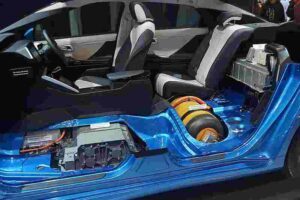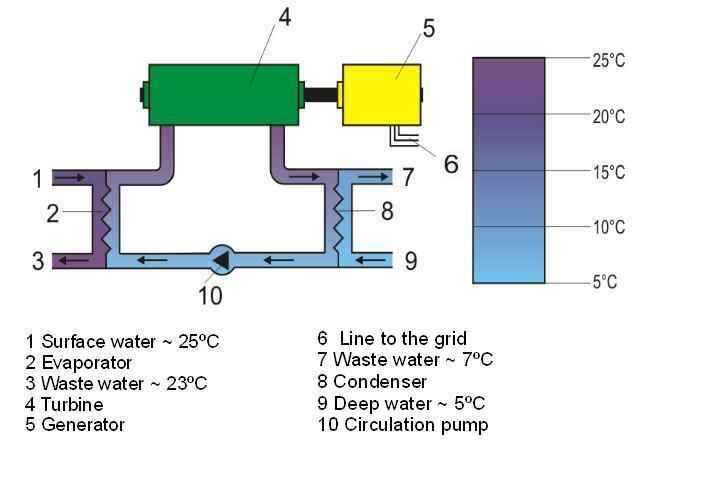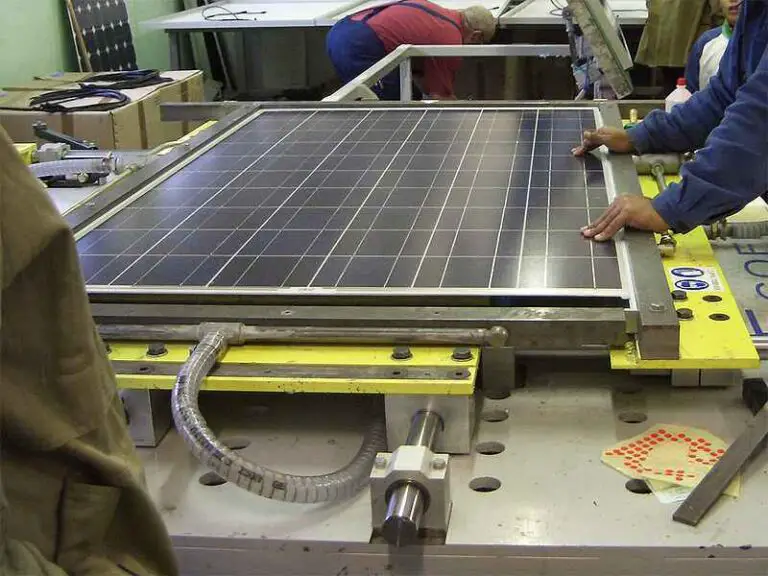Hydrogen Battery Storage, Comparison, Solid State and Application
Hydrogen battery refers to any energy storage system that relies on hydrogen as a major energy resource, and could be in form of an electrochemical fuel cell or a rechargeable battery. This article discusses hydrogen battery storage, comparison, solid state, and application, as outlined below;
-Hydrogen Battery Storage Mechanism and Principle: How a Hydrogen Battery Works
-Hydrogen Battery Vs Lithium-ion Battery
-Hydrogen Battery Cells in Cars
-Hydrogen Battery for Home Usage
Hydrogen Battery Storage Mechanism and Principle: How a Hydrogen Battery Works
A hydrogen battery works by a simultaneous dual-stage process of electrolytic reaction and chemical energy conversion.
Electrolytic reactions in hydrogen batteries are usually between hydrogen and oxygen, where hydrogen occurs at the anode and oxygen at the cathode [2].
The main product of this reaction is water [4], and in the process; chemical energy of hydrogen is converted to electricity that flows through the electrode out of the cell.
Generally, hydrogen batteries do not need to be recharged.
The special attribute of hydrogen battery that differentiates it from other types of batteries is that its sustainability depends on fuel (hydrogen) supply, rather than on recharging.
How long a hydrogen battery lasts depends on its energy efficiency, which may range from 30-75%. In hybrid vehicles and other hydrogen-dependent automobiles, a hydrogen battery or fuel cell can last up to 500 kilometers on a single, full supply of fuel.
Hydrogen Battery Vs Lithium-ion Battery
The main difference between hydrogen and lithium-ion batteries is in their composition and operational mechanism; where hydrogen batteries are chemically comprised of hydrogen fuel and function by electrochemical conversion, while lithium-ion batteries comprise of metallic electrolyte and operate by external charge-driven electron flow cycles.
Hydrogen batteries also tend to exhibit higher energy storage density than lithium-ion batteries [3], and this can be traced to the high energy density of hydrogen itself as a fuel.
In the area of physical attributes, hydrogen batteries have a higher energy-to-weight ration than lithium-ion batteries, meaning that the weight of a hydrogen battery is generally less than that ot a lithium-ion battery of equal energy capacity.
The above mentioned difference is a result low volumetric density of hydrogen, and can be a major advantage especially in systems like vehicles where low-weight and efficient design are very important. In addition to being lighter, hydrogen batteries can be made more compact and smaller in size than lithium-ion batteries.
In terms of means of sustenance, hydrogen batteries depend on fuel supply for their continuity while lithium-ion batteries depend on recharging.
Lithium-ion batteries can be designed to be more physically resilient, flexible, and safe, than hydrogen batteries.
This can be explained in part by the fact that lithium-ion battery technology is more established and mature than hydrogen technology, and has therefore undergone sufficient improvement and modification to develop efficient designs.
While hydrogen batteries are likely to a long service life, they are less-easily replaced than lithium-ion batteries, and their replacement provides less options for flexibility.
Lastly, hydrogen batteries tend to cost more than lithium-ion batteries over their entire lifecycle including purchase and maintenance.
Below is a hydrogen battery vs lithium-ion battery that summarizes the difference between the two types;
Comparison Criteria | Hydrogen Battery | Lithium-ion Battery |
Relative cost | High | Low-moderate |
Recharge dependency | No | Yes |
Fuel dependency | Yes | No |
Relative efficiency | High | Moderate |
Relative ease of replacement | Low | High |
Relative weight | Low | High |
Relative resilience | Low | High |
Technological maturity | Low | High |
Solid State Hydrogen Battery
Solid state hydrogen battery is a type of hydrogen battery that uses a solid hydride as electrolyte, in place of liquid or semi-solid electrolytes.
Examples of solid state hydrogen battery electrolytes include borohydrides like lithium borohydride (LiBH4) [5].
Hydrogen Battery Cells in Cars
A hydrogen car (or hydrogen battery car) is a vehicle that depends partly or solely on hydrogen as a primary source of power.
Batteries in hydrogen cars are commonly fashioned based on fuel cell technology.
While hydrogen can power a car engine effectively, there are in fact few hydrogen powered cars which are commercially available.
It is not very common to use hydrogen to power cars, due to the challenges of hydrogen storage, and the safety risks posed by hydrogen fuel. Hydrogen car technology will likely become more prominent when methods of storage and safety assurance are optimized.

Hydrogen Battery for Home Usage
A hydrogen fuel cell can power a house at any capacity, as illustrated by early commercial hydrogen batteries that store up to 40 kWh of energy, far exceeding the capacity of large solar batteries [1].
Having a hydrogen tank at home that stores liquid hydrogen as a supplementary energy resource, is not recommendable for safety reasons, as well as feasibility and cost.
As an energy storage medium, hydrogen is not cheaper than batteries like lithium-ion, due to the cost of hydrogen itself, and the additional cost of maintenance and cryogenic, high-pressure storage.
However, it is feasible to store liquid hydrogen and use hydrogen in industrial outlets and power plants, provided the requirements for storage and safe use are all met.
Conclusion
Hydrogen battery is any energy storage system in which hydrogen plays a key role as an energy carrier.
A hydrogen battery works by simultaneous electrolysis and chemical energy conversion.
Hydrogen and lithium-ion batteries differ in their cost, operation, ease of replacement, weight, resilience, and technological maturity.
Solid state hydrogen battery is a type of hydrogen battery that uses solid hydrogen-rich electrolytes like lithium borohydride to facilitate electrolysis, energy storage and electricity generation.
Hydrogen battery cars are solely or partly dependent on hydrogen battery cells (or fuel cells) for their operation.
Hydrogen batteries can be used in homes with good performance. It is however recommendable to use solid-state batteries for this purpose, and to prioritize safety in the handling and storage of hydrogen fuel.
References
1). Blain, L. (2021). "World-first home hydrogen battery stores 3x the energy of a Powerwall 2." Available at: https://newatlas.com/energy/lavo-home-hydrogen-battery-storage/. (Accessed 10 January 2023).
2). Dotan, H.; Landman, A.; Sheehan, S. W.; Malviya, K. D.; Shter, G. E.; Grave, D.; Arzi, Z.; Yehudai, N.; Halabi, M.; Gal, N.; Hadari, N.; Cohen, C.; Rothschild, A.; Grader, G. S. (2019). "Decoupled hydrogen and oxygen evolution by a two-step electrochemical–chemical cycle for efficient overall water splitting." Nature Energy 4(9):786-795. Available at: https://doi.org/10.1038/s41560-019-0462-7. (Accessed 12 January 2023).
3). Pellow, M. A.; Emmott, C.; Barnhart, C. J.; Benson, S. M. (2015). "Hydrogen or batteries for grid storage? A net energy analysis." Energy & Environmental Science 8(7). Available at: https://doi.org/10.1039/C4EE04041D. (Accessed 12 January 2023).
4). Rashad, A. A.; Rashad, E. A.; Ali, A. A.; Akram, E.; Al-Rubaye, M.; Yousif, E.; Hairunisa, N. (2017). "Hydrogen in fuel cells: An overview of promotions and demotions." Available at: https://doi.org/10.15761/IJC.1000119. (Accessed 12 January 2023).
5). Suwarno, S.; Nale, A.; Suwarta, P.; Wijayanti, I. D.; Ismail, M. (2022). "Designing Nanoconfined LiBH4 for Solid-State Electrolytes." Front Chem. 2022. Available at: https://doi.org/10.3389/fchem.2022.866959. (Accessed 12 January 2023).


